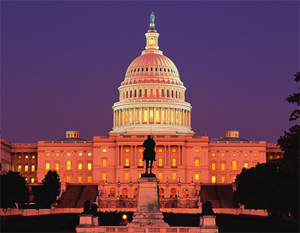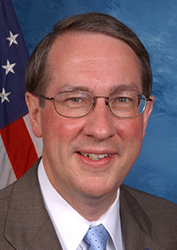 In order to combat the perceived "patent troll" problem, members of Congress in both the House and the Senate introduced bills last spring aimed at addressing abusive patent litigation tactics. One of the more comprehensive "discussion drafts" was released on May 23, 2103 by Rep. Bob Goodlatte (R-VA), the Chairman of the House Committee on the Judiciary (see "Congress Continues Efforts to 'Reform' U.S. Patent Law"). Even though this discussion draft was not technically "introduced," it contained many provisions that were covered in other pieces of legislation that had been introduced, as well some of the various recommendations coming from the White House (see "'When the Patent System is Attacked!' -- The White House Task Force on High-Tech Patent Issues"). As Rep. Goodlatte (below) explained at the time: "This bill helps to address the issues that businesses of all sizes and industries face from patent troll-type behavior and aims to correct the current asymmetries surrounding abusive patent litigation." A second version of this discussion draft was released in the past few days, although it was dated September 6, 2013, and several changes were made as compared to the May 23 version. Because it is possible that some version of this bill has might be passed in the upcoming year or so, we highlight below some of the major provisions of this discussion draft.
In order to combat the perceived "patent troll" problem, members of Congress in both the House and the Senate introduced bills last spring aimed at addressing abusive patent litigation tactics. One of the more comprehensive "discussion drafts" was released on May 23, 2103 by Rep. Bob Goodlatte (R-VA), the Chairman of the House Committee on the Judiciary (see "Congress Continues Efforts to 'Reform' U.S. Patent Law"). Even though this discussion draft was not technically "introduced," it contained many provisions that were covered in other pieces of legislation that had been introduced, as well some of the various recommendations coming from the White House (see "'When the Patent System is Attacked!' -- The White House Task Force on High-Tech Patent Issues"). As Rep. Goodlatte (below) explained at the time: "This bill helps to address the issues that businesses of all sizes and industries face from patent troll-type behavior and aims to correct the current asymmetries surrounding abusive patent litigation." A second version of this discussion draft was released in the past few days, although it was dated September 6, 2013, and several changes were made as compared to the May 23 version. Because it is possible that some version of this bill has might be passed in the upcoming year or so, we highlight below some of the major provisions of this discussion draft.
Patent Infringement Actions
 The section of the discussion draft that will probably result in the most significant changes to the current system if passed is the one that suggests changes to how patent infringement actions are conducted. Some of the more significant proposals are highlighted below. This section begins by proposing changes to the pleading requirements for patent cases. Instead of the notice pleading that is currently required by Form 18 for patent infringement complaints, requiring little more than a statement of jurisdiction and notice as to the patent being asserted and the alleged infringing product or action, the new proposal would require something more akin to the infringement contentions of the party that are generally not required until much later in a case. For example, the new proposal would not only require an identification of each patent allegedly infringed, but also each claim of each patent alleged to be infringed. In addition, for each "accused instrumentality," the new proposal would require in the complaint an explanation as to where each element of each claim is found, whether each element is infringed literally or under the doctrine of equivalents, and how the terms of each claim correspond to the functionality of the accused instrument. Also, the pleadings will require a description of the direct infringement, the person or persons alleged to be directly infringing, and the acts of any alleged indirect infringer that contribute or induce the direct infringement. Finally, the complaint will require a description of the right of the party to assert the patent, a list of complaints already filed which identify the same patent, and whether the patent is subject to any licensing terms or pricing commitments. The good news for the pharmaceutical industry, however, is that this heightened pleading standard would not be required for any Hatch-Waxman type cases that claim infringement under 35 U.S.C. § 271(e)(2).
The section of the discussion draft that will probably result in the most significant changes to the current system if passed is the one that suggests changes to how patent infringement actions are conducted. Some of the more significant proposals are highlighted below. This section begins by proposing changes to the pleading requirements for patent cases. Instead of the notice pleading that is currently required by Form 18 for patent infringement complaints, requiring little more than a statement of jurisdiction and notice as to the patent being asserted and the alleged infringing product or action, the new proposal would require something more akin to the infringement contentions of the party that are generally not required until much later in a case. For example, the new proposal would not only require an identification of each patent allegedly infringed, but also each claim of each patent alleged to be infringed. In addition, for each "accused instrumentality," the new proposal would require in the complaint an explanation as to where each element of each claim is found, whether each element is infringed literally or under the doctrine of equivalents, and how the terms of each claim correspond to the functionality of the accused instrument. Also, the pleadings will require a description of the direct infringement, the person or persons alleged to be directly infringing, and the acts of any alleged indirect infringer that contribute or induce the direct infringement. Finally, the complaint will require a description of the right of the party to assert the patent, a list of complaints already filed which identify the same patent, and whether the patent is subject to any licensing terms or pricing commitments. The good news for the pharmaceutical industry, however, is that this heightened pleading standard would not be required for any Hatch-Waxman type cases that claim infringement under 35 U.S.C. § 271(e)(2).
This "patent litigation" section of the discussion draft also proposes a significant change to 35 U.S.C. § 285, which currently provides for the possibility of awarding attorney's fees to the prevailing party in "exceptional circumstances." Many commentators have suggested that altering this section of the patent act might be the best way to allow courts to combat patent litigation abuses. Indeed, the original discussion draft had proposed removing the "exceptional circumstances" requirement, making it easier for the courts award such fees. However, the new draft goes further. Instead of attorney's fees being a possibility in certain cases, the new proposal requires that the court "shall award" reasonable fees to the prevailing party "unless the court find that the position of the nonprevailing party or parties was substantially justified or that special circumstances make an award unjust." As a result, even though the outcome of the two approaches might be similar, the default as to whether fees are to be awarded would shift to the affirmative in all cases.
In another part of this section of the discussion draft, changes to discovery in patent litigation are proposed. For example, the proposal provides that if a court determines that any claims need to be construed, discovery shall be limited to the information required for such construction until the court has ruled on the issue. Because discovery can be one of the most protracted parts of patent litigation, and the claim construction process can also be time-consuming, such a proposal could have the effect of severely extending the time to trial in patent infringement cases. This is probably one of the reasons why the proposal would exclude cases where timely resolution is essential, such as Hatch-Waxman type cases, which ideally should conclude before the expiration of the 30-month stay.
Transparency of Patent Ownership
The Goodlatte discussion draft also tackles the issue of patent ownership, which was also the subject of several other pieces of introduced legislation, and has been suggested by commentators as a mechanism to prevent PAEs from using shell companies to hide the true parties-in-interest. The proposal would require a plaintiff to disclose to the Patent Office, the court, and every adverse party, the assignee of the patents at issue, any party with the right to sublicense or enforce the patents at issue, any entity that has a financial interest in the patents at issue (or the plaintiff), and the ultimate parent of any assignees. Again, there is good news for the pharmaceutical industry because causes of action brought pursuant to § 271(e)(2) would be exempt from this requirement. The proposal would also create an on-going duty to notify the patent office of any changes to the assignee of the patents. If a plaintiff does not comply with these requirements, that party will not be entitled to recover attorney's fees or increased damages for willfulness during the period of noncompliance. The Court will also have the ability to award fees to the accused infringer for any expenses incurred to discover any updated assignment.
Customer-Suit Exception
The discussion draft would amend 35 U.S.C § 296 to allow a stay of an infringement action against a customer if the same or a similar suit has been initiated against the manufacturer of the accused product. Such as stay would only be allowed if both the covered manufacturer and the covered customer consent in writing. Also, the covered customer would need to agree to be bound by any judgment to the extent any issues are in common. This proposal appears to be in response to the "anti-troll" sentiment that blames PAEs for targeting end-users instead of the companies that manufacture the alleged infringing products. Interestingly, the revised draft does not include a provision that allows a manufacturer to intervene in cases where the downstream customers and retailers are targeted, as could have been found in the previous discussion draft.
Improvements and Technical Corrections to the Leahy-Smith America Invents Act
The discussion draft also includes some proposals to improve or correct the recently enacted America Invents Act. One proposal would be to remove the estoppel effect of the post-grant review process as to issues the party "reasonably could have raised." Another proposal would require the PTAB to construe claims in the same manner as district courts by using the "ordinary and customary meaning of such claim as understood by one of ordinary skill in the art and the prosecution history pertaining to the patent." Moreover, if the claims have already been construed in Federal court, the Patent Office would be required to consider such construction. The discussion draft also includes a proposal to expand Covered Business Method Reviews. However, as we reported yesterday, many organization and companies, across the technological spectrum, oppose any such expansion of these reviews (see "Coalition Opposes Expansion of AIA § 18").
Finally, the discussion draft includes several other provisions, including recommendations to the Judicial Conference, providing for small business education and outreach, and tasking the director and the GAO to study issues related to patent transactions, patent quality, and patent examination. We will, of course, continue to follow and report on the progress of this discussion draft, as well any comparable bills that are introduced in either the House or the Senate.